| Pages:
1
2
3
..
10 |
Practicaler
Harmless

Posts: 42
Registered: 24-3-2012
Member Is Offline
Mood: Exploding
|
|
Gun Propellants: Single, Double and Tripple based
Hello users of scienemadness.
Friend currently I am making various types of bullets for testing their different power . What I want to know is various types of propellants that are
filled inside the bullet to give it very high velocity. .till now u could find smokeless powder double base propellants . But I couldn't find their
actual composition and how to make these propellants.will anyone please tell me a very powerful propellant that can give very high velocity to bullet
and how to make it please help me . Please
[Edited on 28-10-2016 by Bert]
|
|
|
hissingnoise
International Hazard
    
Posts: 3940
Registered: 26-12-2002
Member Is Offline
Mood: Pulverulescent!
|
|
Few here will want to answer a question on stuff you can maim or kill yourself with when the question is couched in such k3wlish terms . . .
|
|
|
franklyn
International Hazard
    
Posts: 3026
Registered: 30-5-2006
Location: Da Big Apple
Member Is Offline
Mood: No Mood
|
|
@ hissingnoise
Oh I don't know , it is evident that English is not this person's native language.
I wonder hissingnoise how you would come across with a little help from babelfish.
@ Practicaler
Smokeless powder used in small caliber personal arms is universally nitrocellulose
with some nitroglycerine and graphite which serves to drain static electric charge
that could ignite the powder. Rate of burn is determined by the size and shape of
the grains , this will determine how soon peak chamber pressure is developed for
a given amount of powder. Producing consistent reliable propellant is not
something which can be made without specialized equipment.
See chapter 9 of Military Explosives TM 9-1300-214
http://ia701505.us.archive.org/29/items/milmanual-tm-9-1300-...
Makers of propellants provide loading data for their powders. Gun magazines
publish bibles with loading data on every imaginable cartridge.
Do not exceed amounts published before having the experience and know how
to inspect the spent brass from your hand loaded cartridges for signs of having
reached the maximum pressure. Shooting a 'proof load ' , which is a cartridge
crammed full of powder , is only done as a quality test by arms manufacturers ,
and will very quickly make a firearm unfit for use , if a cartridge has not burst
before then.
.
|
|
|
hissingnoise
International Hazard
    
Posts: 3940
Registered: 26-12-2002
Member Is Offline
Mood: Pulverulescent!
|
|
| Quote: | | Oh I don't know , it is evident that English is not this person's native language. |
Of course! That'd explain him being most active in Detritus . . .
At least he didn't get the spoonfeeding he wanted!
|
|
|
Practicaler
Harmless

Posts: 42
Registered: 24-3-2012
Member Is Offline
Mood: Exploding
|
|
When bullet is fired does smokeless powder detonates or just burn extremely fast providing a great thrust and will anyone tell me how to make
smokeless powder
|
|
|
Morgan
International Hazard
    
Posts: 1705
Registered: 28-12-2010
Member Is Offline
Mood: No Mood
|
|
I ran across this article some time ago but it strikes me as a good example of how times have changed.
http://books.google.com/books?id=kiEDAAAAMBAJ&pg=PA200&a...
|
|
|
Swede
Hazard to Others
  
Posts: 491
Registered: 4-9-2008
Member Is Offline
Mood: No Mood
|
|
Smokeless powder is not an easy thing to make.
Single base (nitrocotton) or double base (added nitroglycerin) both start with highly nitrated cellulose, guncotton. Guncotton is not particularly
hard to make, but keeping it stable is. Typical nitrocotton from the amateur lab will have a very limited shelf life, and can degrade into a
dangerous state, which was the source of numerous fatal (sometimes devastating) accidents, when rotten guncotton exploded, such as in the magazine of
a battleship.
The guncotton is turned into a colloid, using solvents like acetone and alcohols. It is then extruded under high pressure through dies, and automated
machinery cuts the extrusion into rods, flakes, cords. Look up cordite.
Without an added stabilizer like diphenylamine, this propellant has the same dangers as crude guncotton.
If you really want to explore propellants, start with the grandaddy of them all - black powder.
|
|
|
Practicaler
Harmless

Posts: 42
Registered: 24-3-2012
Member Is Offline
Mood: Exploding
|
|
I have already made blackpowder with mostly all the oxidizer like potassium chlorate,potassium perchlorate, nitrates ,permanganate and iodates. Just I
want to know the correct procedures to make smokeless propellant or any other powerful propellant
|
|
|
Bert
Super Administrator
        
Posts: 2821
Registered: 12-3-2004
Member Is Offline
Mood: " I think we are all going to die. I think that love is an illusion. We are flawed, my darling".
|
|
You have been given links to information on how it is made. No one is going to give you a step by step instruction manual, and that's for your own
good.
Rapopart’s Rules for critical commentary:
1. Attempt to re-express your target’s position so clearly, vividly and fairly that your target says: “Thanks, I wish I’d thought of putting it
that way.”
2. List any points of agreement (especially if they are not matters of general or widespread agreement).
3. Mention anything you have learned from your target.
4. Only then are you permitted to say so much as a word of rebuttal or criticism.
Anatol Rapoport was a Russian-born American mathematical psychologist (1911-2007).
|
|
|
ScienceSquirrel
International Hazard
    
Posts: 1863
Registered: 18-6-2008
Location: Brittany
Member Is Offline
Mood: Dogs are pets but cats are little furry humans with four feet and self determination! 
|
|
To be honest I doubt that you can make advanced powders without a great deal of equipment, money and effort.
These materials are very powerful and a wrongly compounded mixture could result in a serious accident.
See here for Wikipedia articles which are well referenced;
http://en.wikipedia.org/wiki/Smokeless_powder
http://en.wikipedia.org/wiki/Cordite
I suspect that even making black powder that would give adequate performance when hand loaded into cartridges would require considerable effort and
depending on your jurisdiction and the licences and permits held by you might be illegal.
A quick Google on "homemade black powder cartridges" will reveal plenty of references but unless you are already experienced in muzzle loading weapons
or cartridge reloading you are going to have a lot of difficulties.
|
|
|
ScienceSquirrel
International Hazard
    
Posts: 1863
Registered: 18-6-2008
Location: Brittany
Member Is Offline
Mood: Dogs are pets but cats are little furry humans with four feet and self determination! 
|
|
I should say that this part of the forum is supposed to be about the preparation of energetic materials on an experimental basis.
The law is cloudy in most places.
But making small amounts of silver acetylide, lead azide, nitrocellulose, etc is probably legal if it is conducted on a small scale in a spirit of
intellectual curiosity and there is no intention to cause an explosion.
Obviously there is a lot of latttude but making weapons like bombs and ammunition may be outside the remit of the forum.
|
|
|
KonkreteRocketry
Hazard to Others
  
Posts: 165
Registered: 12-11-2012
Location: Dubai
Member Is Offline
Mood: No Mood
|
|
I have a friend who like Zinc Sulfur, he make his own Zinc Sulfur bullets, when he fires, it make a beautiful flame, he told me he like it, I am not
sure if it is good though..
He have his own way of grinding it into micro sizes, he uses 2 steel plates 1 little bit curved, and 1 flat, and grind the zinc into really small
pieces, he showed me in microscopes it was around 1 micron only, I often go there to smash aluminium for my own interest for other fuels..
|
|
|
Vikascoder
Hazard to Others
  
Posts: 309
Registered: 28-1-2012
Member Is Offline
Mood: No Mood
|
|
But zinc sulfur is mostly used as rocket fuel I don't think that it is so powerful that it can give high thrust to bullet to give them highspeed
Girls break promises like a small child breaks pencil tips so don't trust girl bcoz no girl=no tension
|
|
|
KonkreteRocketry
Hazard to Others
  
Posts: 165
Registered: 12-11-2012
Location: Dubai
Member Is Offline
Mood: No Mood
|
|
Quote: Originally posted by Vikascoder  | | But zinc sulfur is mostly used as rocket fuel I don't think that it is so powerful that it can give high thrust to bullet to give them highspeed
|
zinc sulfur have a fast burn rate therefore you can add more fuel ? I am not sure.
|
|
|
Ral123
National Hazard
   
Posts: 735
Registered: 31-12-2011
Member Is Offline
Mood: No Mood
|
|
The biggest problem is to keep the powder from going high order. I've made 3 tests:
fuse+cotton= nice shot
fuse+azide+cotton= couldn't find a single piece of the pipe. The sound was like TNP
fuze+plasticised NC particles= a flame from the fuse hole and no bang.
If NC only doesn't go high order, I feel shooting would be pretty safe. Commercial powders generally can be set off with a modern No8 or a small
booster. I want the homemade single base propellant to be that detonation resistant.
|
|
|
Motherload
Hazard to Others
  
Posts: 245
Registered: 12-8-2012
Location: Sewer
Member Is Offline
Mood: Shitty
|
|
In the event that you must absolutely need propellant for loading ammunition and smokeless powder cannot be procured ..... Use black powder.
You will not get nearly the same velocities but you won't blow your self up with it..
Also it will dirty up the firearm a looottt faster.
Trying to make smokeless powder at home is like trying to make modern paint for walls or engine oil for you vehicle etc at home ..... but more
dangerous.
"Chance favours the prepared mind"
"Fuck It !! We'll do it live !!"
|
|
|
Ral123
National Hazard
   
Posts: 735
Registered: 31-12-2011
Member Is Offline
Mood: No Mood
|
|
TNP can paint quite well, trust me. You can't wash it away from you fingers for weeks. Cooking oil is oil. I've used it in ball mill gears and
engines. It's excellent the first months.
For non detonating propellant IMO KClO4/C/S is powerful and safe.
http://www.youtube.com/watch?v=KfzQ4uKvE7c
|
|
|
Vikascoder
Hazard to Others
  
Posts: 309
Registered: 28-1-2012
Member Is Offline
Mood: No Mood
|
|
If you are really testing various propellants I am curious to know your results with flash powder . Whether your gun exploded or not after using flash
powder I am sure your barrel must have got heated a lot with flash powder . What's was the damage done by bullet or I mean penetration in wooden box
or something like that while using flash powder pls post ur results
Girls break promises like a small child breaks pencil tips so don't trust girl bcoz no girl=no tension
|
|
|
Ral123
National Hazard
   
Posts: 735
Registered: 31-12-2011
Member Is Offline
Mood: No Mood
|
|
KClO4/C/S + a little ETN and Al. The mixture wasn't granulated, but wasn't packed tightly and reaches great pressures with the confinement of a single
lead ball. Here's a real torture test:
http://www.youtube.com/watch?v=DAiK4HJ3qkk
The barrel is blown to small pieces with:
1)azide-nitrated cotton
2)black powder, setting off EGDN/NC.
Planks near the barrel were ripped.
|
|
|
Motherload
Hazard to Others
  
Posts: 245
Registered: 12-8-2012
Location: Sewer
Member Is Offline
Mood: Shitty
|
|
The only problem with KClO4 is it produces KCl after ignition.
KCl will cause bad rusting if the firearm isn't cleaned within a short period.
Any one who has fired corrosive mil-surp ammo will know what I mean.
The corrosive nature came from chlorate primers.
"Chance favours the prepared mind"
"Fuck It !! We'll do it live !!"
|
|
|
Ral123
National Hazard
   
Posts: 735
Registered: 31-12-2011
Member Is Offline
Mood: No Mood
|
|
Considering the tree tests I described, I think the corrosion is the least of your worries. That mixture appears(so far) detonation resisting and
quite powerful. My tests suggest a detonation can rip one's arm no difficulties.
|
|
|
Hennig Brand
International Hazard
    
Posts: 1284
Registered: 7-6-2009
Member Is Offline
Mood: No Mood
|
|
These are stills from a video taken about three years ago. The homemade cannon was charged with 2-2.5g of nitrated cotton ball (nitrocellulose) and a
45 cal. lead ball. Ignition was accomplished with a bit of thin blackmatch. A small amount of black powder was also poured into the touch hole,
before inserting the fuse. The piece of wood in the picture was dry beech hardwood, which is a fairly dense, tough wood. The 2-2.5g of nitrocellulose
drove the lead ball through the wood very easily. Sorry, I don't remember exactly how thick the wood was.
The exit side of the piece of wood was dark from carbon because a smaller charge (~1g of nitrocellulose IIRC), was used to fire a 45 cal. lead ball
at that side earlier. In that test the lead ball did not penetrate all the way through the wood. I also remember that the nitrocellulose used for both
tests was not the most highly nitrated that I had ever made by a long shot.
This may be a little off topic, but I thought it was interesting. Two of the biggest reasons this test was relatively safe was because the weapon
wasn't being held when it was fired and the barrel was extremely thick steel.
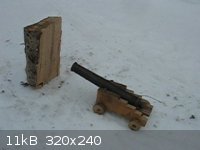 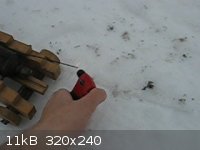 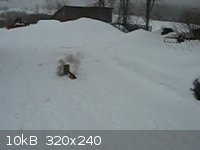 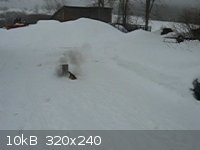 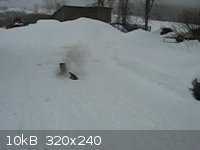 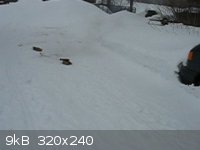 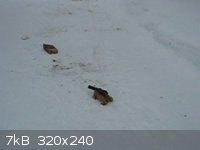 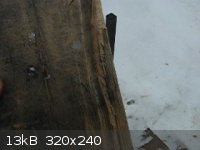 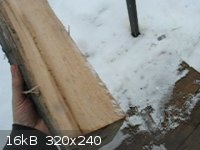 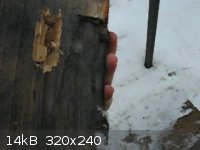
[Edited on 2-3-2014 by Hennig Brand]
"A risk-free world is a very dull world, one from which we are apt to learn little of consequence." -Geerat Vermeij
|
|
|
Ral123
National Hazard
   
Posts: 735
Registered: 31-12-2011
Member Is Offline
Mood: No Mood
|
|
That amount of NC is too much even for DE .50 AE. It should generate over 2000j of kinetic energy. I dream of having gun cotton that wont detonate.
You can expect high penetration in wood with copper jacketed steel ball covered in a little oil or something.
|
|
|
Hennig Brand
International Hazard
    
Posts: 1284
Registered: 7-6-2009
Member Is Offline
Mood: No Mood
|
|
Yeah, it was a lot of nitrocellulose and it made a great bang. It was almost as much fun as a good detonation. The lead balls were melt/casted from
lead flashing (very soft lead without antimony). The cannon was bored out for 0.50 cal., but my ball mold is 0.45 or maybe a little bigger.
IIRC, I read that one of the original NC propellant experimenters dissolved the fluffy NC in a solvent and poured it out in a thin sheet to dry. It
was then cut up into little discs or particles of some kind which had much better burn characteristics and safety than the fluffy NC it was made from.
I think this could be made to work pretty easily and make a reasonable propellant. This would of course just be single base propellant, so production
should be a little simpler to get consistent results with than with double and triple base propellants.
Edit:
Ok, this is from someone's blog, but I read the same (or similar) passage from an older book years ago.
"In 1884, a French chemist named Paul Viellie succeeded in improving guncotton's stability issues. He discovered that by treating guncotton with a
mixture of alcohol and ether, it could be gelatinized. The material could then be rolled into sheets, cut into small squares or flakes and then
stabilized with a 2% solution of diphenylamine. This formulation was codenamed Poudre B by the French government and it was a closely guarded secret.
This formula produces a substance that is much more stable than guncotton and it will not detonate unless it is compressed. Unlike black powder,
Poudre B also burns when wet and produces about three times the force for the same volume. This was the first "single-base" powder. The French
developed the 8 mm. Lebel cartridge (the first smokeless military cartridge) and a new rifle, the Lebel Model 1886 to use this new technology. "
[Edited on 3-3-2014 by Hennig Brand]
"A risk-free world is a very dull world, one from which we are apt to learn little of consequence." -Geerat Vermeij
|
|
|
Ral123
National Hazard
   
Posts: 735
Registered: 31-12-2011
Member Is Offline
Mood: No Mood
|
|
I've tried it, the plastic NC particles need a little initial kick, like from LS or may be some cotton NC. The problem is that I don't trust the home
made plasticised from completely, to shoot with it. Maybe only in 5.5 pellet gun or something.
In my leave on the sun in a dark container in the summer test, the NC cotton did very well. It's just washed, but showed no signs of decomposition.
|
|
|
| Pages:
1
2
3
..
10 |